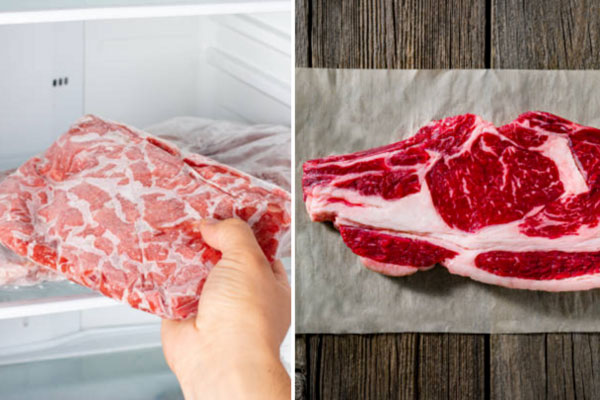Beef has a higher iron content than chicken or fish. Lean beef is rich in vitamins and minerals, especially zinc. Therefore, this food is recommended as part of a healthy diet.
Due to habits and living conditions, many people often freeze food, including beef, and then cook it later. Knowing how to defrost beef quickly while retaining its nutritional value is essential for cooks.
Tips for Quick and Nutritious Beef Defrosting
Properly and quickly defrosting beef can save you time and maintain the quality of the meat. Otherwise, the beef may become tough or, worse, contaminated, posing health risks. Try these three quick and nutritious beef defrosting techniques.
Defrosting in the Fridge
This is the safest method that best preserves the quality of the meat.
Instructions: Transfer the beef from the freezer to the refrigerator. After about 24 hours, the beef should be completely defrosted.
Defrosting with Cold Water
This technique is faster than the previous one but may slightly compromise the meat’s quality.
Instructions: Place the beef in a sealed zip bag and immerse it in a bowl of cold water. Change the water every 30 minutes to maintain a stable temperature. The beef should be completely defrosted in about 1-3 hours.

A quick and nutritious way to defrost beef. (Photo: Istock)
Defrosting in the Microwave
This method is quick and convenient: place the beef on a suitable dish and put it in the microwave. Use the defrost setting, and heat for 5-15 minutes depending on the size of the meat.
With this method, cook the beef immediately to prevent overcooking or contamination.
Using a Cutting Board or Metal Surface
This technique utilizes the high thermal conductivity of metal to quickly defrost the beef.
Instructions: Place the beef on a clean cutting board or metal surface. Without soaking or microwaving, leave the beef at room temperature and turn it over occasionally. It should be completely defrosted in about 1-2 hours.
Precautions When Defrosting Beef
– Avoid defrosting beef at room temperature for extended periods, as it provides an ideal environment for bacterial growth.
– Do not refreeze thawed beef. Instead, cook it immediately or store it in the refrigerator for up to one day.
– When defrosting with cold water, use a sealed zip bag to prevent water from seeping into the meat and compromising its nutritional value.
Health Benefits of Beef
The high nutritional content and valuable components of beef offer the following health benefits:
Maintaining Muscle Mass
Beef is a rich source of high-quality protein, containing all the essential amino acids that the body cannot synthesize on its own.
Many people, especially the elderly, do not consume enough of these essential amino acids. Inadequate protein intake can accelerate age-related muscle loss and increase the risk of conditions such as muscle weakness and Sarcopenia.
Sarcopenia is a severe health issue in older adults, but it can be prevented by incorporating regular exercise and increasing protein intake.
Including beef in your diet, along with other high-quality protein sources, helps maintain muscle mass and reduce the risk of Sarcopenia.
Improving Exercise Performance
Carnosine, formed in the body from beta-alanine (an amino acid found in high amounts in fish and meat, including beef), is essential for muscle function.
Carnosine in the muscles is associated with reduced fatigue and improved exercise performance. Additionally, controlled studies have shown that beta-alanine supplements can enhance running time and strength.
According to VTC News





































